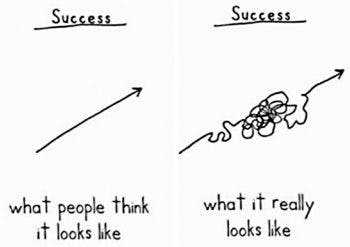A spinal cord injury is a traumatic event that can lead to a wide array of physical and emotional problems. While it’s not always easy, it’s essential to be positive and stay motivated towards spinal cord injury recovery.
To help motivate you on the road to recovery, we’ve put together a list of 6 things every individual needs to know for a successful recovery.
We hope this article inspires you with a fresh perspective.
1. Things Get Worse Before They Get Better
Before spinal cord injury recovery takes place, your spinal cord may go into spinal shock. This occurs when the body sends out a bunch of powerful chemicals to stabilize the spinal cord after trauma.
The chemicals (or immune response) can cause your spinal cord to swell, which affects the amount of blood and nutrients that it receives.
Remember, your blood is filled with oxygen to fuel your cells and allow the body to function properly. This swelling can limit blood flow in the spinal cord resulting in loss of control of some movements.
Don’t worry, this is temporary! Healing takes time.
Once the swelling dies down, some functions that were affected may gradually start to return.
2. Spinal Cord Injury Recovery is Possible
The spinal cord is made up of a bunch of neural pathways that connect your brain to your body. In a spinal cord injury, these pathways are damaged which is why you may experience weakness or paralysis. However, there is hope!
Neuroplasticity is your central nervous system’s ability to rewire itself. This is the most important concept you need to understand about spinal cord injury recovery.
The spinal cord is capable of learning, forgetting, and relearning functions. Chances are, your spinal cord injury did not completely transect your spinal cord.
Some pathways may have been spared (although, they might be a little traumatized). Fortunately, these spared pathways are your greatest hope for recovery.
Neuroplasticity works through these spared pathways. They can create new connections to the brain so that you can recover lost functions.
Performing lots of repetitive movements is the best way to activate neuroplasticity.
The more you practice moving (massed practice), the stronger the pathways get, and the more natural movements become during spinal cord injury recovery.
3. It’s Never Too Late for Spinal Cord Injury Recovery

Drawing by Demitri Martin
Sometimes, weeks or even months, may pass without seeing any improvement. This is completely normal because spinal cord injury recovery does not progress in a straightforward path.
After a traumatic event, like a spinal cord injury, the spinal cord enters an optimal period of learning.
This typically lasts about 6 months and explains why the most recovery is observed during the early periods following a SCI.
However, this does not mean that your ability to relearn goes away. The spinal cord will always be able to adapt and learn, so if you’re willing to put in the effort, we believe it’s never too late for recovery!
Many patients see improvements years following their injury. Recovery is all about consistency and trusting the process.
4. Your Mental Health is Just as Important as Your Physical Health
Spinal cord injury recovery is both a physical and mental journey. Your mental state affects your physical state just as much as your physical state affects your mental state.
Think holistically. Your mind and body function best when you eat well, exercise regularly and get quality sleep.
But sometimes life gets chaotic and overwhelming, and your schedule falls off track. Remember that’s not the end of the world, and to pick back up where you left off.
5. You are Not Alone
You don’t have to go through spinal cord injury recovery on your own. Don’t be afraid to ask for help! Your friends and family want to see you get better.
If you ever feel like your loved ones just don’t understand what you’re going through, then consider joining a spinal cord injury support group. There, you’ll be surrounded by lots of people that have been in your situation. You can help each other out by sharing experiences. Joining a support group is also a great way to gain access to a plethora of information and helpful resources.
If you can’t find a spinal cord injury support group near you, consider joining an online support group or forum. Technology makes it easier than ever to communicate with others when you don’t even have to leave your home!
6. Hope and Positivity are Essential for Recovery
Be an opportunist! Spinal cord injury recovery can provide you with a new sense of purpose. Dwelling on the past will hold you back. Think in the present and envision a positive future.
This doesn’t mean you have to find all new hobbies and forget about the things you loved before. However, you do have to be open to adjusting or relearning new ways to do things.
Accept your situation and figure out what you can do from now on to make things work.
Spinal cord injury recovery is a long journey and not every day is going to be easy, but as long as you keep going, your hard work will pay off. We highly recommend documenting your progress through pictures, videos, or journal entries to remind yourself where you started and how far you’ve come.
Hopefully, this article inspired you to continue working hard towards your recovery.
Spinal cord injury recovery may just be the most rewarding experience of your life, so stick to it!
For an extra motivation boost, check out these spinal cord injury recovery stories!
The post Finding Hope for Recovery After Spinal Cord Injury appeared first on Flint Rehab.



